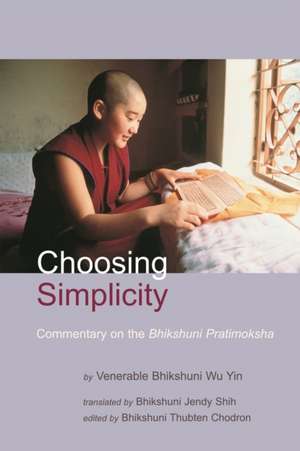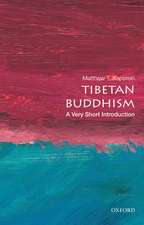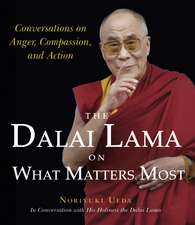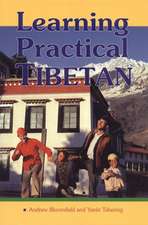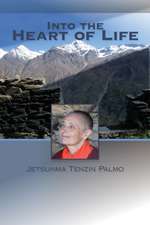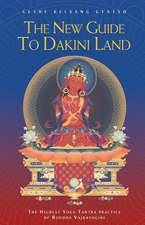Choosing Simplicity: A Commentary on the Bhikshuni Pratimoksha
Autor Venerable Bhikshuni Master Wu Yin Editat de Bhikshuni Thubten Chodron Traducere de Bhikshuni Jendy Shihen Limba Engleză Paperback – 31 dec 2000
Preț: 149.11 lei
Nou
Puncte Express: 224
Preț estimativ în valută:
28.54€ • 31.01$ • 23.99£
28.54€ • 31.01$ • 23.99£
Carte disponibilă
Livrare economică 31 martie-14 aprilie
Preluare comenzi: 021 569.72.76
Specificații
ISBN-13: 9781559391559
ISBN-10: 1559391553
Pagini: 338
Ilustrații: illustrations
Dimensiuni: 153 x 228 x 25 mm
Greutate: 0.5 kg
Editura: Snow Lion Publications
ISBN-10: 1559391553
Pagini: 338
Ilustrații: illustrations
Dimensiuni: 153 x 228 x 25 mm
Greutate: 0.5 kg
Editura: Snow Lion Publications
Notă biografică
Venerable Bhikshuni Wu Yin received her novice vows in 1957 and her bhikshuni vows in 1959. She is the leader of the Luminary International Buddhist Society, which oversees study programs for nuns and laypeople, as well as translation and publishing projects.
Recenzii
"By providing an insider's perspective on the challenges of being a Buddhist monastic and a woman, the book makes a valuable contribution to the fields of religious history, anthropology, ethics, and women's history."—Journal of Asian Studies
"Choosing simplicity in our affluent society means choosing sanity. Christians as well as Buddhists are discovering how monastic values can enrich their lives as lay people. For monastics and lay people alike, Choosing Simplicity will be a book worth reading."—Brother David Steindl-Rast, OSB, author of A Listening Heart
"It is of great importance that Buddhist monasticism become firmly established in the West. This excellent book makes a major contribution to this becoming a reality."—Pema Chödrön, Director of Gampo Abbey, Nova Scotia
"Until now there has been no comprehensive translation nor commentary on the precepts for Buddhist nuns available in English. . . . Includes fascinating accounts of the history behind the vows and the reasons for keeping them."—Ven. Mitra Bishop, sensei, resident teacher at Mountain Gate in northern New Mexico and spiritual director of Hidden Valley Zen Center in San Marcos, California
"More than a handbook to a Buddhist monastic life, this text offers guidelines to all who wish to conduct their day-to-day lives more mindfully. Choosing Simplicity can mean saving time and energy for the important things."—Continuing Threads
"The book not only helps nurture an understanding of the meaning and value of Buddhist monasticism but also offers essential commentary in simple language for Buddhists in the West who choose a monastic lifestyle."—Karma Lekshe Tsomo, University of Hawaii
"Far from being just a dry list of rules, the material comes alive, thanks to Master Wu Yin's approach, as she discusses them based on her years of experience in living and working with them in her monastery in Taiwan. She presents the Bhikshuni Pratimoksa rules, developed by the Buddha himself, as a living body of material that is still relevant in modern life."—Elizabeth Napper, author of Mind in Tibetan Buddhism
"By examining how the ordination vows act as guidelines to promote individual peace and personal simplicity, Choosing Simplicity: A Commentary on the Bhikshuni Pratimoksha by Venerable Bhikshuni Wu Yin . . . is a glance at a feminine lifestyle that utterly challenges the attainment-based culture that women, and particularly American women, have been so thoroughly sold on. So what stress-beating experiences could reading a manual on the female Buddhist relationships to food, clothing, shelter, and possessions possibly offer? All I can tell you is that such an immersion is like taking a trip to sanity for a while; people of all faiths and cultures can benefit from even such random samples of monastic experience. Just completing a chapter I felt more mindful than when I started. And as weeks passed the precepts crept through my consciousness as I went about my days."—Shoreline Newspapers
"Choosing simplicity in our affluent society means choosing sanity. Christians as well as Buddhists are discovering how monastic values can enrich their lives as lay people. For monastics and lay people alike, Choosing Simplicity will be a book worth reading."—Brother David Steindl-Rast, OSB, author of A Listening Heart
"It is of great importance that Buddhist monasticism become firmly established in the West. This excellent book makes a major contribution to this becoming a reality."—Pema Chödrön, Director of Gampo Abbey, Nova Scotia
"Until now there has been no comprehensive translation nor commentary on the precepts for Buddhist nuns available in English. . . . Includes fascinating accounts of the history behind the vows and the reasons for keeping them."—Ven. Mitra Bishop, sensei, resident teacher at Mountain Gate in northern New Mexico and spiritual director of Hidden Valley Zen Center in San Marcos, California
"More than a handbook to a Buddhist monastic life, this text offers guidelines to all who wish to conduct their day-to-day lives more mindfully. Choosing Simplicity can mean saving time and energy for the important things."—Continuing Threads
"The book not only helps nurture an understanding of the meaning and value of Buddhist monasticism but also offers essential commentary in simple language for Buddhists in the West who choose a monastic lifestyle."—Karma Lekshe Tsomo, University of Hawaii
"Far from being just a dry list of rules, the material comes alive, thanks to Master Wu Yin's approach, as she discusses them based on her years of experience in living and working with them in her monastery in Taiwan. She presents the Bhikshuni Pratimoksa rules, developed by the Buddha himself, as a living body of material that is still relevant in modern life."—Elizabeth Napper, author of Mind in Tibetan Buddhism
"By examining how the ordination vows act as guidelines to promote individual peace and personal simplicity, Choosing Simplicity: A Commentary on the Bhikshuni Pratimoksha by Venerable Bhikshuni Wu Yin . . . is a glance at a feminine lifestyle that utterly challenges the attainment-based culture that women, and particularly American women, have been so thoroughly sold on. So what stress-beating experiences could reading a manual on the female Buddhist relationships to food, clothing, shelter, and possessions possibly offer? All I can tell you is that such an immersion is like taking a trip to sanity for a while; people of all faiths and cultures can benefit from even such random samples of monastic experience. Just completing a chapter I felt more mindful than when I started. And as weeks passed the precepts crept through my consciousness as I went about my days."—Shoreline Newspapers
